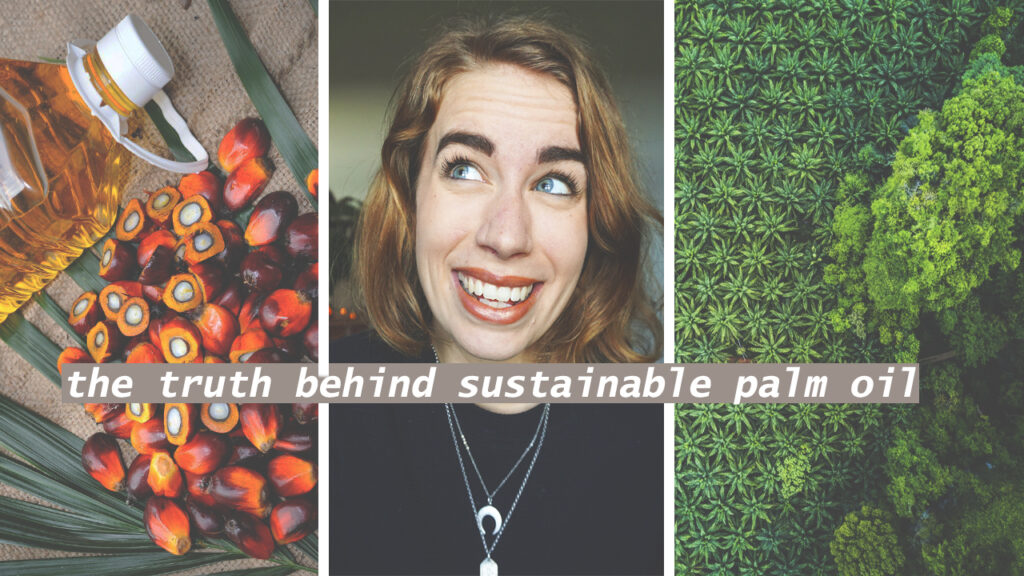
- Palm oil is widely considered to be one of the most utilized ingredients in everything from processed foods to cosmetics and biofuels. 1/3 of the global consumption of vegetable oils comes from palm oil. It is estimated that 50% of all the products consumed in the US contain palm oil. In 2017, 51% of Europe’s consumption of palm oil was utilized to power cars and trucks with biofuel. The oil palm tree is originally native to West Africa where is it still produced for domestic use. However today, palm oil is grown around the globe, but 85% of the production comes from Indonesia and Malaysia.
The benefits of palm oil:
- Palm oil is a natural preservative, and contains no trans-fats and will extend the shelf life of the products its in. It’s known as a high yield crop and is considered one of the cheapest crops to produce, making the crop the base of an 88 billion dollar industry and responsible for 6 million jobs worldwide, 2,2 million of these are small farmers. The palm oil industry leaves very little fruit waste, as both oil, kernel and flesh is utilized to make different products.
The not so good things about palm oil:
- 65 million metric tons of palm oil are produced every year, however, only 17% of the industry is considered sustainable.
- Between 2001 and 2010 palm oil products in Indonesia generated up to 268 million metric tons of carbon emissions.
- Indonesia and Malaysia, while hosting the world’s main palm oil industry, is also the home rich wildlife, which is constantly risking extinction as a result of palm oil production.
- From 1999 to 2015 nearly 150,000 endangered orangutans have been killed due to hunting and deforestations.
- Air pollutions from deforestation fires in Indonesia in 2015 resulted in 12.000 premature deaths, and nearly half of the country’s greenhouse gas emissions come from forest fires, set to clear lands for palm oil production.
- Furthermore, the palm oil industry is affected by corruption and human rights violations including abuse and child labor. The industry also deliberately bulldozes indigenous villages leaving entire communities homeless as a result of the expanding palm oil industry.
Sustainability initiatives
- In 2014 RSPO was founded. Roundtable on Sustainable Palm oil created a sustainability certification system which means to integrate sustainable policies into the industry. The RSPO has been named “the best in class among standards” by WWF when it comes to certified sustainable palm oil.
- However, the policies of RSPO has been criticized by several scientists and new platforms, because of the lack of assurance of the results of their policies, for deliberating formulating vague and imprecise criteria, for the being corrupted by industrial interests rather than ecological and for protecting the cooperations who fail to meet their sustainability goals like Johnson & Johnson and Kraft-Heinz, who supposedly are “sustainable” RSPO member but refuse to give insight into their “sustainable” production.
- Contrastingly, several initiatives have encouraged consumers to boycott palm oil altogether, like the Islandic anti-palm oil ad that went viral a couple of years ago.
- However, a complete boycott can be detrimental in many ways. According to the International Union for Conservation of Nature, a boycott would displace the destruction of the palm oil industry, putting pressure on other industries and the production of other crops that require more land and resources to grow.
How do we fix this?
- The consumers cannot fix the issue alone, but changing your shopping habits is still an important step. CEO of the Malaysian Palm Oil Council stated that they are able to produce their palm oil increasingly sustainable, but see no reason to as consumers are already buying the products.
- But, businesses must take a lead and act and not wait for consumer demand. The palm oil industry is very untransparent and many consumers still lack the proper knowledge to buy consciously. Just looking at the ingredients list is not as easy as it sounds. Whenever it says “vegetable oil” changes are it is palm oil. Furthermore, palm oil has over 25 descriptive names it makes the matter even more complicated. So businesses must accept their ecological responsibility before consumer demand.
- Governments have a responsibility as well. In many of the production countries, deforestation is not illegal and there are made very little research on the exact extent of the destruction of plant and animal habitat – which the industry takes full advantage of.
- Even though the RSPO is not in any way perfect, it still seems like the most efficient indicator of sustainable palm oil, however, it should be noted that the sustainability certification is used in greenwashing.
- As a consumer, it helps to cut down on products like processed foods and cosmetics, which also ties perfectly together with a zero-waste lifestyle, since many of these products are often heavily packaged. You can also boycott any number of companies that do nothing to ensure sustainable production, Unilever comes to mind at this point.
- I guess it’s a little bit utopic for the average consumer to live a complete palm oil-free live, but remembering to vote with our money is something that everyone can do. Maybe it’s just choosing a locally produced product rather than an imported one, if that’s what you can do, then you’re doing great sweetie.
- Remembering that we as consumers have a lot of power to change industries is what personally keeps me motived to make conscious decisions and refusing products that are unnecessary or harmful.
Sources:
- https://www.nationalgeographic.com/magazine/2018/12/palm-oil-products-borneo-africa-environment-impact/
- https://greenpalm.org/about-greenpalm
- https://www.eco-business.com/news/what-is-sustainable-palm-oil/
- http://palmoilscorecard.panda.org/
- https://www.independent.co.uk/news/world/asia/palm-oil-sustainable-certified-plantations-orangutans-indonesia-southeast-asia-greenwashing-purdue-a8674681.html?amp
- https://amp.theguardian.com/sustainable-business/2014/nov/26/10-things-you-need-to-know-about-sustainable-palm-oil
- https://www.abc.net.au/news/science/2018-06-16/orangutan-video-comes-as-sustainable-palm-oil-questioned/9811642
Advertisements




